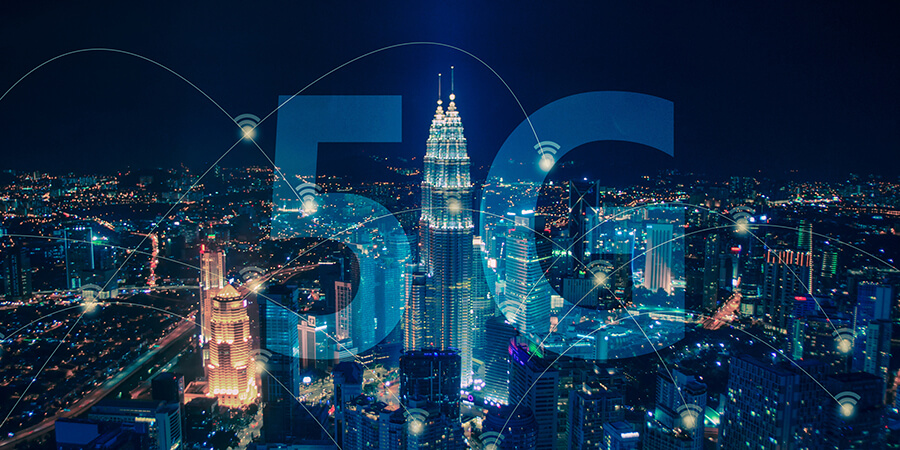Malaysia will be shifting from its existing single wholesale network model to embracing a dual 5G network to address industry concerns of unfair pricing and lack of transparency under the state-controlled Digital Nasional Berhad (DNB), a special purpose vehicle established by the government to deploy and manage the country’s 5G network.
In a press conference last week, Communications Minister Fahmi Fadzil said that a new entity will be established after the country reaches 80% coverage to deploy the country’s second 5G network. A second network will increase overall capacity to support the country’s digital ambitions and address concerns about single-point failures.
“We are ensuring interoperability so in case one network were to be affected, for whatever reason, there’s a fallback network,” he said. “The switch from a single to a dual wholesale network would be implemented in line with global practices.”
Currently, DNB has reached 57.8% coverage, with coverage expected to reach 80% by the end of the year, when about another 2,000 transmitter sites are expected to be built.
More Than One Entity for 5G Networks
In July 2021, Ericsson won a $2.5 billion tender to provide equipment for Malaysia’s sole 5G network under DNB. With this new development, Fahmi confirmed that the contract with Ericsson remains binding. However, an open tender to award a provider for a second network will take place.
Amid reports that Huawei is interested in building Malaysia’s 5G network, the US and the European Union have warned the Malaysian government against permitting Chinese telecom providers to participate in the tender, citing risks to national security.
It has been suggested that the use of Chinese telecommunications equipment could threaten the country’s incoming investments from the EU and the US. On the other hand, there could be pressure from China to permit the use of Chinese equipment.
Responding to geopolitical tension between the East and West, Fahmi expressed that Malaysia will make its decision independently, based on a provider’s ability to match the country’s technology requirements, and will not succumb to foreign pressure.
DNB was established under former Prime Minister Muhyiddin Yassin. Under his administration, the state-owned vehicle owns Malaysia’s single wholesale 5G network and all 5G spectrum. Last October, local telcos entered into respective 5G agreements with DNB. 35% is owned by the government, while the remaining 65% is divided between Digi Telecommunications, Celcom Axiata, Telekom Malaysia and YTL Communications. On the other hand, Maxis did not invest in DNB, while U Mobile signed an access agreement to provide 5G services to subscribers even though it does not have stakes in DNB.
After Prime Minister Anwar Ibrahim took office in November 2022, he called for a review of Malaysia’s future 5G deployment and management.
Malaysia’s 5G journey has not been smooth sailing. In 2021, local telcos did not see eye to eye with the former government’s decision to set up DNB over auctioning 5G spectrum as a practice carried out by most countries. Eventually, all telcos finally agreed to buy stakes in DNB, only to have two telcos retract their decision.
Finally, all local telcos are agreeable with the government’s decision to pursue a dual network and are on board with the government’s 5G plan. In a press release, Maxis welcomes the government’s decision to implement 5G under two networks and is committed to playing a more direct role in the country’s 5G implementation, leveraging its expertise, resources and existing infrastructure.
U Mobile noted that “the upcoming shift in 5G network model would increase efficiencies and also encourage greater adoption for both consumers and enterprises.”
In a statement released, CelcomDigi, the merged entity between Digi Telecommunications and Celcom Axiata, announced that it has terminated the respective agreements of its subsidiaries to subscribe for a 12.5% stake each in DNB. However, this does not affect their ability to support 5G services to subscribers.
“The termination of the respective SSA will clear the path for CelcomDigi to participate in any new process, including equity participation, together with the industry.”
The telco expressed “the need for the efficient rollout of 5G based on the new enhanced model to provide wide and comprehensive coverage, encourage adoption and ensure affordability of 5G services for all Malaysians.” The telco looks forward to leveraging its experience and resources to support the delivery of the next phase of Malaysia’s 5G journey.
Over the weekend, Fahmi shared that he will be meeting with local telcos to discuss this further. Moving forward, Malaysia has to reconsider its future 5G trajectory, ensuring a well-thought-out plan that balances diplomacy within the East and West.





